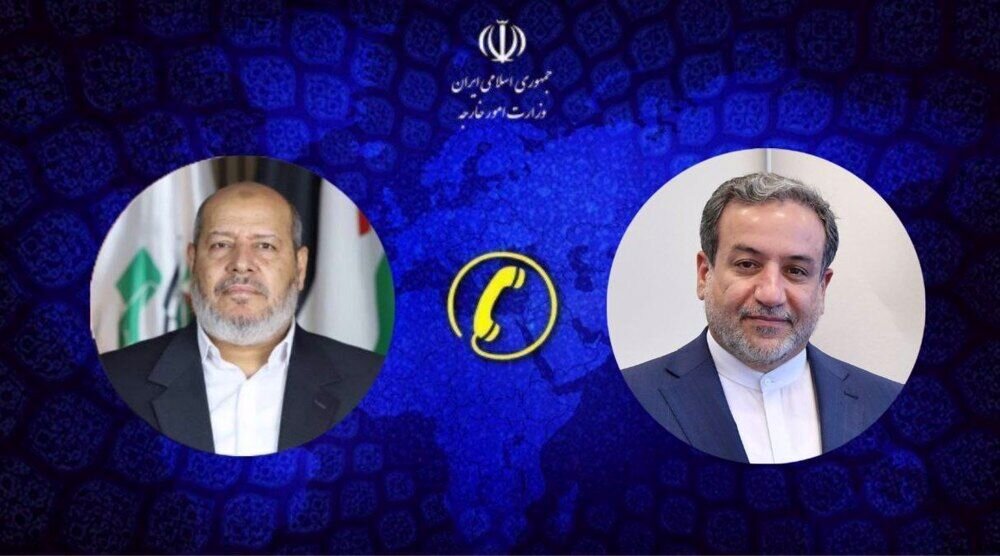Araghchi congratulates Hamas on Gaza ceasefire victory

TEHRAN – Iran's Foreign Minister Abbas Araghchi congratulated the Palestinian Resistance group Hamas for its "significant victory over Israel in the conflict in Gaza."
The statement was made during a Thursday phone call with Khalil al-Hayya, deputy leader of Hamas's Political Bureau, after a ceasefire was announced to end Israel's deadly war in Gaza.
During the conversation, Araghchi praised the indomitable spirit of the Palestinian people amid "the occupying regime's genocidal acts and unprecedented atrocities over the past 15 months."
He asserted that the Palestinian Resistance forced the occupying forces to capitulate to a ceasefire and prisoner exchange agreement.
Reiterating Iran's steadfast commitment, Araghchi highlighted the country's ongoing support for the Palestinian struggle and their resistance against the occupation, as well as their right to self-determination.
For his part, Al-Hayya updated Araghchi on the current situation in Gaza and the state of ceasefire talks.
The Palestinian official expressed gratitude for Iran's backing, as well as the support from Resistance factions in Lebanon, Yemen, and Iraq, which he deemed crucial to this monumental triumph.
Al-Hayya vowed that the determined and courageous Palestinian people would persist in their struggle with unparalleled unity and solidarity until all their rightful claims are fulfilled.
Qatar’s Prime Minister Mohammed Al Thani officially announced the ceasefire late Wednesday.
The agreement, structured in three phases, is set to commence on Sunday, spanning 42 days.
The truce aims to halt the Israeli regime's devastating military campaign in Gaza and includes a significant prisoner swap, with 1,000 Palestinian prisoners and hundreds of long-term detainees slated for release.
Hamas will release 33 Israeli captives in the first phase as the Israeli military begins withdrawal from the enclave.
Acknowledging Egypt and Qatar's role
Araghchi also discussed the Gaza ceasefire in separate phone calls with his Qatari and Egyptian counterparts on Thursday.
In a conversation with Egyptian Foreign Minister Badr Abdelatty, the Iranian top diplomat recognized Egypt's role in brokering the truce and expressed hope for its complete implementation. Abdelatty, in turn, welcomed the ceasefire and hoped it would alleviate Gaza's humanitarian crisis.
During his call with Qatari Prime Minister and Foreign Minister Mohammed bin Abdulrahman Al Thani, Araghchi praised Qatar's efforts in securing the ceasefire. He also stressed the importance of international action to improve living conditions in Gaza through immediate humanitarian assistance, refugee support, and the reconstruction of infrastructure damaged by Israeli aggression.
The Qatari diplomat shared details of the negotiation process that led to the ceasefire and acknowledged Iran's steadfast support for Palestinians, particularly during the recent conflict.
Israel's latest war against Palestinians in Gaza began on October 2, 2023, after Hamas managed to infiltrate the occupied territories through an unprecedently successful operation. The group said the operation was conducted in response to the regime’s escalating violence against Palestinians and the repeated desecrations of the al-Aqsa Mosque.
A subsequent 15-month period of Israeli aggression in Gaza led to the near obliteration of the territory's homes, hospitals, schools, religious sites, and civilian infrastructure. The conflict also left behind a grim carnage of at least 46,000 Palestinian deaths and over 110,000 injuries.
Axis of Resistance’s support for Gaza
The Resistance Axis, including Iran, Hezbollah in Lebanon, Ansarullah in Yemen, and various Resistance groups in Iraq, have undertaken numerous operations and attacks in support of Gaza since October 2023.
Iran directly attacked Israeli positions in the occupied territories twice in 2024. The operations dubbed ‘True Promise’ hit military sites across occupied Palestine with the help of hundreds of drones and missiles. Simultaneously, it offered logistical and diplomatic support to other factions within the Resistance front.
Hezbollah engaged in military operations along the border to divert Israeli resources from Gaza, leading to significant sacrifices, including the loss of its revered leader, Sayyed Hassan Nasrallah, and other senior commanders.
In Iraq, the Resistance groups not only targeted U.S. military facilities but also directly aimed at Israel.
Yemen's Ansarullah focused its efforts on the Red Sea, targeting ships linked to the Israeli regime or heading to its ports, as well as launching direct attacks on Israel.
Meanwhile, many regional and Islamic nations were either apathetic or implicitly supportive of Israel in the past 15 months. Some have pursued diplomatic normalization with Tel Aviv, while others have tacitly backed the regime through trade or by failing to oppose its actions in international forums, despite widespread circulation of images of Israel's harrowing crimes.
